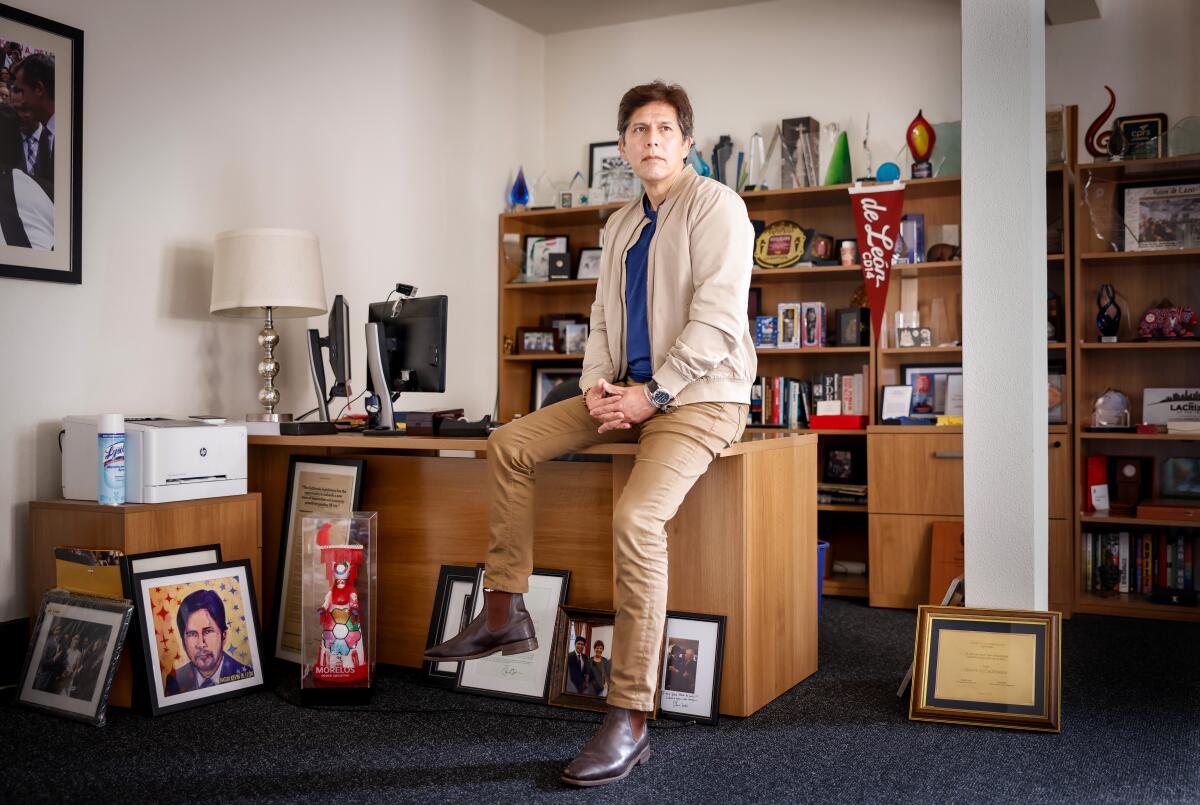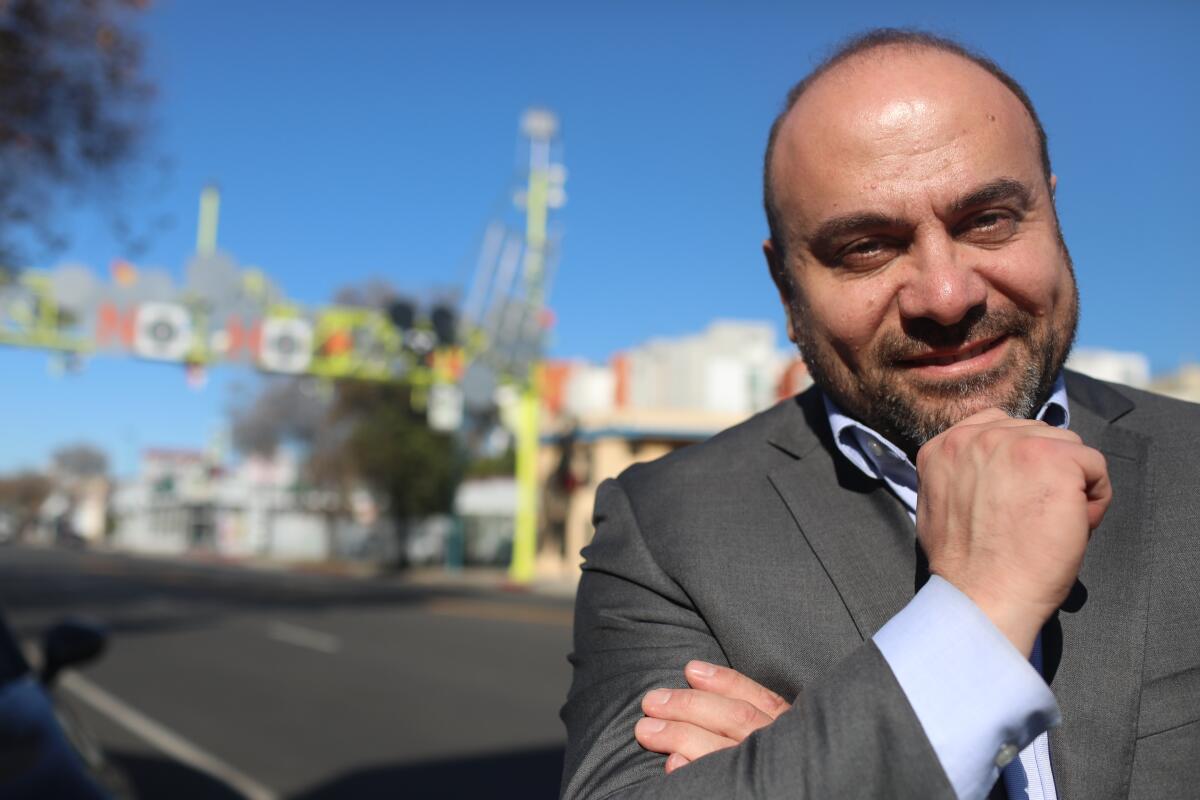In two L.A. City Council races, police ‘abolition’ is a wedge issue

Long before she uttered the words “F— the police,” Los Angeles City Council candidate Ysabel Jurado made clear she was not happy with the city’s approach to public safety.
In a candidate questionnaire last year, Jurado promised to move money out of the LAPD and into other programs. She said police should be removed from K-12 schools. And she described herself as an “abolitionist” — someone who favors the “abolition of police and the prison industrial complex.”
“I believe that we keep ourselves safe,” she wrote in the 20-page questionnaire she provided to the Democratic Socialists of America — now one of her most crucial supporters.
Tuesday’s election will determine whether Jurado and her allies can push City Hall further left on public safety by expanding the bloc of council members who want to rein in police spending and reallocate the savings.
Jurado, a tenant rights attorney, is looking to unseat Councilmember Kevin de León in an Eastside district. Another DSA-backed candidate, business owner Jillian Burgos, is gunning for a seat in the San Fernando Valley.
In both contests, police abolition — and law enforcement spending overall — has emerged as a political fault line, particularly for voters worried about crime and disorder.
Jurado, through a spokesperson, has described abolition as an aspirational goal, one that would take many years and many steps. De León says Jurado’s words should be taken literally, and seriously, by voters in his district, which stretches from downtown to El Sereno and Eagle Rock.

De León, who has highlighted the issue in campaign mailers, calls Jurado’s approach to public safety “elitist and irresponsible,” saying low-income neighborhoods would suffer the most. He ramped up his attacks over the last week after Jurado told a group of college students, “What’s the rap verse? F— the police, that’s how I see ‘em,” in response to a question about abolishing the police.
“We need the police to keep our communities safe. It’s just that simple,” De León said. “Every nation in the world, including the most progressive nations — Scandinavian countries, Sweden, Finland, Norway — they have police.”
Jurado has disputed the idea that she would defund the LAPD, telling audiences she still wants officers responding to violent crime. At the same time, she has argued that — with 1 in 4 city dollars going to the Los Angeles Police Department — too much is being spent on police.
“The safest cities in America invest in recreation and parks, libraries and our youth, but we’re not doing that,” she said.
Three of the council’s 15 members voted against Mayor Karen Bass’ budget this year, in large part because of their objections to police spending. Jurado and Burgos, if elected, could add two more votes to that bloc.
De León and former state Assemblymember Adrin Nazarian, who is facing off against Burgos, support Bass’ push to hire more police and return the department to 9,500 officers. Both are in favor of the mayor’s decision to give a package of raises and bonuses to police, which is expected to add $400 million to the city’s yearly budget by 2027.
Jurado opposes both efforts. So does Burgos, an optician and part owner of a murder mystery theater company. On the day the council approved the police raises, Burgos accused city leaders of choosing “militarization” over humanity, saying the money should have gone to housing and community services instead.
“Crime is down overall,” she said in an interview. “I think we can invest in other solutions.”
Like Jurado, Burgos identified herself as an abolitionist in her DSA questionnaire. Like Jurado, she told the DSA she would remove police officers from K-12 schools. Both said police unions should not be part of the Los Angeles County Federation of Labor, which represents about 300 union groups and is a major fixture in city politics.

The DSA’s L.A. chapter has become a powerful political force, pushing city leaders for stronger tenant protections, higher wages and lower law enforcement spending. Over the last four years, the group has worked to successfully unseat three City Hall incumbents.
It has been a key supporter of Burgos, sending 167 people to knock on doors for her, according to a spokesperson for the L.A. chapter. Nearly 330 DSA volunteers have done the same for Jurado, the spokesperson said.
The Los Angeles Police Protective League, which represents rank-and-file officers, has sought to counter those efforts, sending campaign mailers that call Burgos’ public safety platform “dangerous.” The union has allocated $445,000 for canvassers, digital ads and other efforts to defeat Jurado and reelect De León.
“Ms. Jurado told [voters] loud and clear that if she wins, it will be ‘F-the police,’ and that means fewer officers patrolling neighborhoods and enforcing the law,” Police Protective League President Craig Lally said in a statement.
The two council contests come as LAPD sworn staffing has shrunk about 12% over the last five years, to about 8,800 officers — the lowest point since 2002. Bass and the council have attempted to reverse the slide by giving raises, increasing starting pay and offering retention bonuses.
Those measures are expected to take a big bite out of the city budget, adding an estimated $1 billion in costs over a four-year period. With city leaders struggling to balance the books, many other city agencies have had to make cuts, leaving positions vacant or eliminating them entirely.
Even with a smaller LAPD, homicides in the city have declined 29% this year compared with the same period in 2022. The number of gunshot victims dropped 27%, according to the LAPD.
Jennifer Macias, who co-chairs the DSA’s L.A. chapter, said her organization added the abolition question to its candidate surveys after George Floyd was murdered by police in Minneapolis. She called the question an important part of the endorsement process — and “integral” to the group’s values.
Macias, who lives in Jefferson Park, said the city needs a way to respond to emergencies without involving police who are “systemically violent.” She described police abolition — the idea of getting to zero officers — as “a North Star goal” that will be achieved only over time, after other programs are put in place.
“Not having the police doesn’t mean that we’re not responding to harm,” she said.
Burgos said that, for her, abolition means moving away from “reactive” law enforcement responses and toward expanded social services, such as job training, job placements and mental health care.
“All of that is community care, and that’s what I am for,” the North Hollywood resident said.
Nazarian, like the three other candidates, said he wants to expand the city’s network of unarmed responders to assist people experiencing nonviolent mental health crises. At the same time, he slammed the idea of police abolition, saying there’s “nothing progressive” about it.
“The rich and the upper class will always find a way. They will hire their own security,” the North Hollywood resident said. “What will be left is the majority of the population — the middle class and the poorer working class — who will be left to fend for themselves.”

Nazarian, whose family fled Iran when he was 8, said there will always be people who seek to victimize others, and therefore, a need for police.
Jurado, for her part, said she has never used the phrase “defund” while referring to the LAPD. At the Cal State L.A. event where she said “F— the police,” she also argued that police should be focusing on gangs, violent crime and “the drugs that are invading our communities.”
In an interview, Jurado said she does not yet know whether she would routinely vote against LAPD spending proposals that come before the council, as one of her closest allies, Councilmember Eunisses Hernandez, has done.
“We check boxes” on questionnaires, Jurado said. “But at the end of the day, we use our best judgment.”
Over the last week, Jurado has dismissed the criticism of her “F— the police” remark, saying it was “just a lyric” from a rap song. She called the attack ads from the police union “noise.”

If recent L.A. elections are any guide, the Highland Park resident has reason to be confident.
Hernandez, who also represents part of the Eastside, defeated two-term incumbent Gil Cedillo in 2022 while identifying herself as an abolitionist. She scored that victory even after the police union sent mailers warning that her policies would result in the release of rapists and violent criminals.
Councilmember Hugo Soto-Martínez, while running in 2022, also identified himself as an abolitionist in his DSA questionnaire. He defeated the incumbent, Mitch O’Farrell, by a wide margin.
“Abolition gets thrown out as a scare tactic and a way to divide people,” he said. “But many abolitionists believe that the way we root out crime, the way we stop crime, is by putting resources into families and into communities, and that will eventually lead to a society where we don’t need police officers. It’s very utopian when you think about it.”
Soto-Martínez pointed out that De León courted the Democratic Socialists in 2018, when he was a state lawmaker seeking to unseat U.S. Sen. Dianne Feinstein. Although De León’s DSA candidate questionnaire did not include a question about police abolition, he came out in favor of abolishing Immigration and Customs Enforcement, the federal agency that polices the border.
These days, De León is slamming Jurado as the “handpicked” DSA candidate, calling her public safety views “too dangerous” for L.A. That shows that De León is “a hypocrite,” Soto-Martínez said.
De León, in response, said this year’s DSA is “not the same as the Bernie Sanders DSA in 2016 or 2018.” Abolition of police, he said, is just one area where the group has become too extreme.
De León, who lives in Eagle Rock, has been at odds with Hernandez and Soto-Martínez over copper wire theft, which has left many streets — including the newly built 6th Street Bridge — in darkness. Hernandez and Soto-Martínez cast the only votes against De León’s plan to create a task force to combat such thefts.
Last summer, De León credited the task force with making 82 arrests and recovering 2,000 pounds of copper.
De León’s approach to public safety has resonated with at least some constituents. Last week, dozens gathered in Highland Park to denounce Jurado’s use of the F-word and voice support for the LAPD.
“In this crazy world that we live in, we need to fund the police, not you-know-what the police,” El Sereno resident Eddie Santillan said.
Times staff writer Libor Jany contributed to this report.
More to Read
Sign up for Essential California
The most important California stories and recommendations in your inbox every morning.
You may occasionally receive promotional content from the Los Angeles Times.











